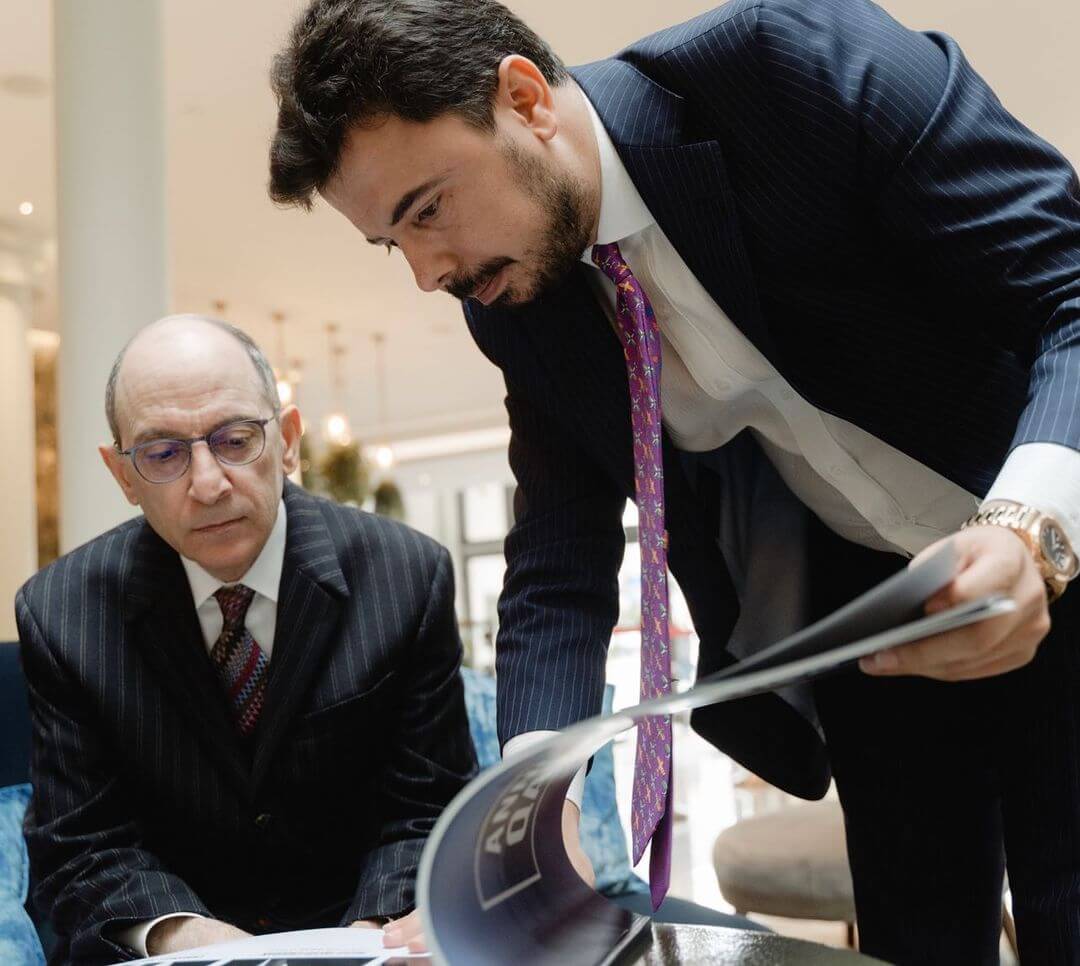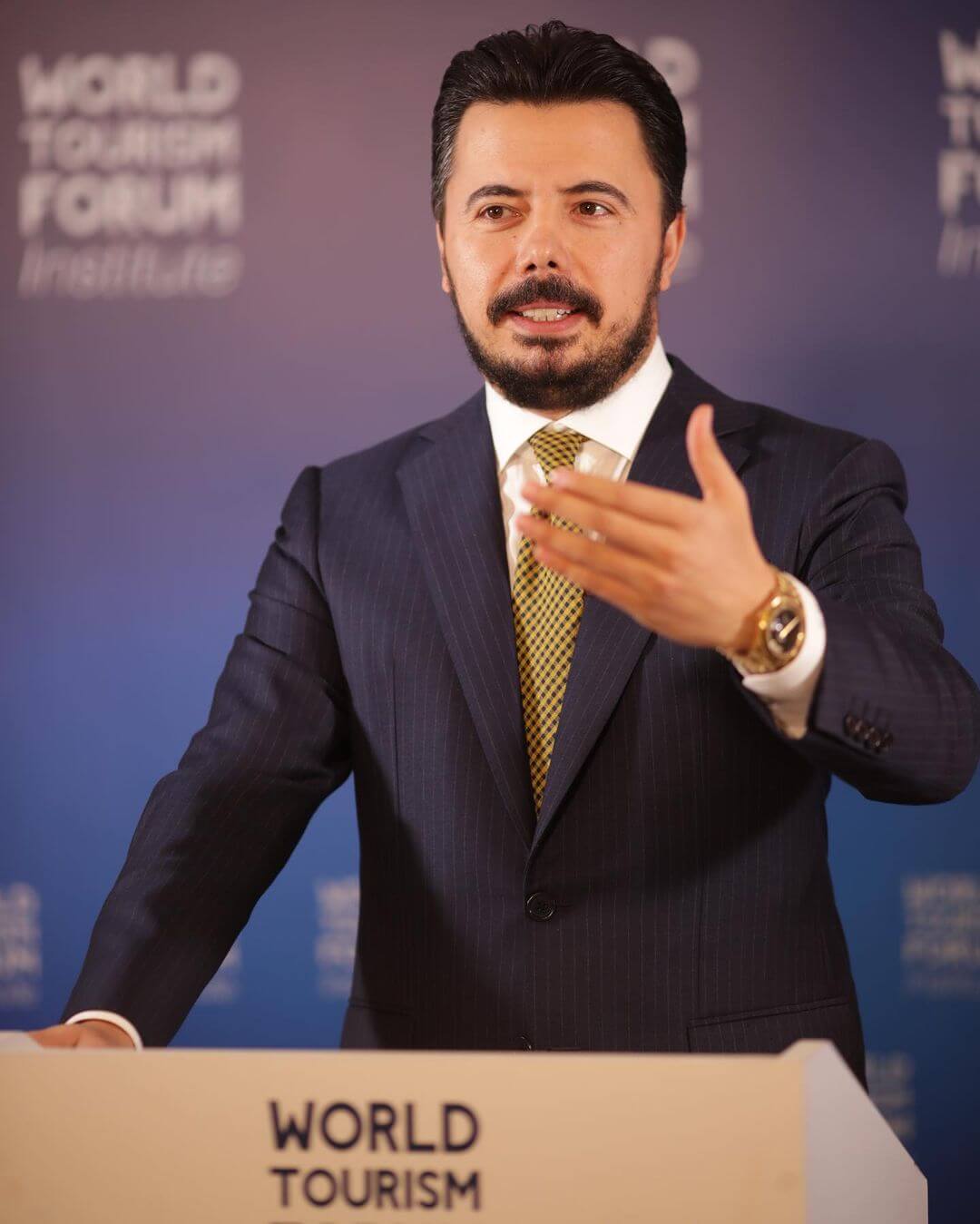Navigating the Future of Tourism: Insights from Bulut Bağcı, President of the Global Tourism Forum

Bulut Bağcı, the President of the Global Tourism Forum
Meet Bulut Bağcı, a forward-thinking entrepreneur whose remarkable journey began with a degree in Tourism Administration from Turkey’s prestigious Boğaziçi University. With over a decade of experience in both national and international organizations, his visionary approach led him to identify a crucial gap in the global tourism landscape. In response, he founded the World Tourism Forum Institute, which has since transformed into the Global Tourism Forum, earning acclaim as the “Davos of the international tourism industry.” Bulut Bağcı’s pioneering spirit and influential leadership have set new industry trends, and he continues to shape the future of international tourism through various initiatives and speaking engagements at prestigious global events.

Bulut Bağcı, the President of the Global Tourism Forum
As the founder and president of the World Tourism Forum Institute, you transformed it into the Global Tourism Forum to significantly impact the global tourism market. What is the main mission behind the setup of the institution?
At the World Tourism Forum Institute, we established the Global Tourism Forum (GTF) with a vision to enhance and promote global tourism in a sustainable manner. Our institution is dedicated to a comprehensive agenda that encompasses the following key objectives:
We aim to promote sustainable tourism markets by serving as a dynamic platform for global tourism enterprises. Through this platform, we encourage the introduction and cultivation of sustainable socio-economic markets by stimulating demand for sustainable consumption.
Moreover, GTF plays a crucial role in facilitating dialogue and fostering a global network among diverse stakeholders within the tourism industry. This includes government entities, private sector businesses, academia, and civil society.
Another pivotal aspect of our mission is the promotion of innovation and best practices within the tourism sector. The Global Tourism Forum identifies and promotes innovative solutions and best practices.
We strongly emphasize the importance of professional education within the tourism task force. Our support extends to training programs, research initiatives, and knowledge dissemination, all aimed at empowering professionals and entrepreneurs in the field.
Furthermore, our institution is committed to contributing to the economic development of regions and countries through tourism.
Finally, the Global Tourism Forum advocates for ethical and inclusive tourism practices. We encourage tourism that respects cultural diversity, promotes gender equality, and supports marginalized communities.

Meeting African tourism leaders. Source: Instagram @bulutbagci
Diplomacy is another shift in your career. In your role as Honorary Consul of the Republic of Gabon in Antalya, how do you see your responsibilities aligning with your work in the tourism industry, and what opportunities do you envision for both Gabon and Turkey in this context?
This represents a significant addition to my career, and I see several exciting opportunities for Gabon and Turkey in this context.
Еourism in Gabon is a relatively untapped market with immense potential. Gabon is known for its stunning natural beauty, including pristine rainforests, diverse wildlife, and a breathtaking coastline along the Atlantic Ocean. As Honorary Consul, I see my responsibilities as encompassing the promotion of Gabon as a unique and sustainable tourist destination. By leveraging my experience in the tourism industry, I can facilitate partnerships and collaborations between Turkish and Gabonese tourism stakeholders, leading to the development of eco-tourism initiatives, cultural exchanges, and investment opportunities.
Here are some highlights of tourism in Gabon that can be further developed and promoted: Wildlife Safaris, National Parks and Reserves, Beaches and Islands, Cultural Experiences, and Sustainable Tourism.
My role as Honorary Consul of the Republic of Gabon in Antalya presents a unique opportunity to bridge my experience in the tourism industry with diplomatic efforts to promote Gabon as a sustainable and exciting destination. By facilitating partnerships and exchanges, I believe we can unlock the full potential of Gabon’s tourism sector while fostering stronger ties between Gabon and Turkey.

With H.E Akbar Al Baker, the CEO of @qatarairways and Chairman of @visitqatar. Source: Instagram @bulutbagci
With your extensive experience in the tourism industry, what do you believe are the key challenges and opportunities facing the sector today, especially considering the global changes and disruptions in recent years? (we can remember the COVID period, the ecology with new approaches towards air transportation, and the development of “staycations” within the country as a solution).
The tourism sector confronts a trifecta of challenges: first, the immediate and profound impact of the COVID-19 pandemic with travel restrictions and lockdowns leading to significant revenue loss and business closures; second, mounting environmental concerns related to climate change and sustainability, driven by eco-conscious travelers demanding greener practices; and third, the aviation industry’s turbulence during the pandemic prompting a push for more sustainable air travel options, including electric aircraft and biofuels, to mitigate environmental impact.
A multitude of opportunities emerges within the tourism sector: firstly, the pandemic has fueled a surge in domestic tourism and “staycations,” offering a chance for local businesses and attractions to prosper; secondly, a growing demand for sustainable and eco-friendly tourism experiences presents an avenue for destinations that prioritize conservation, responsible practices, and community support; thirdly, the industry’s embrace of technology through contactless check-ins, virtual tours, and online booking platforms enhances the traveler’s experience and operational efficiency; The adoption of health and safety protocols in response to the pandemic can continue to foster traveler trust. Collaboration among governments, businesses, and organizations is pivotal for resilience and recovery, while innovation in product offerings and marketing strategies can fortify the tourism sector; lastly, as international travel restrictions persist, promoting cultural exchange within countries and regions becomes an opportunity to reinforce national identity and local tourism.

As The President of @worldtourismforuminstitute in Brussels 4-6 September 2023. Source: Instagram @bulutbagci
As we all know, the world is becoming more and more interconnected. Tourism is a new “green oil” as you said yourself. What would be the destinations gambling on tourism today that work on the development of this industry in depth? (I would think of the KSA which is diversifying its economy, Dubai and Oman for example, but there are other destinations).
You’re absolutely right; tourism has become a valuable “green oil” for many destinations, and several countries are making significant investments in developing this industry. While KSA, Dubai, and Oman are indeed notable examples, there are several other destinations worth mentioning that are actively working on the deepening and diversification of their tourism sectors:
Rwanda: Rwanda, known for its stunning landscapes and conservation efforts, has made strides in sustainable tourism. The country’s focus on wildlife conservation, such as the protection of mountain gorillas, and its commitment to eco-friendly practices have attracted travelers seeking unique and responsible experiences.
Bhutan: Bhutan has long prioritized sustainability through its concept of Gross National Happiness. The country limits the number of tourists, requires a minimum daily spending amount, and invests in preserving its cultural and natural heritage. This approach has made Bhutan an attractive destination for mindful travelers.
Portugal: Portugal has seen a tourism renaissance in recent years, partly due to its focus on authenticity and cultural experiences. The country offers diverse experiences, from exploring historic cities like Lisbon and Porto to enjoying the serene beauty of the Azores and Madeira.
New Zealand: Known for its breathtaking landscapes, New Zealand has been investing in adventure tourism and ecotourism. The country offers opportunities for activities like hiking, kayaking, and wildlife encounters, appealing to nature enthusiasts.
Bali, Indonesia: Bali is reinventing itself beyond the traditional beach destination. It now emphasizes wellness and cultural tourism, with wellness retreats, yoga centers, and a rich cultural scene that includes art, dance, and spirituality.
Georgia: Georgia is emerging as a destination for wine tourism. With a rich wine-making tradition dating back thousands of years, Georgia is attracting wine enthusiasts seeking unique experiences in its vineyards and cellars.
Iceland: Iceland’s stunning landscapes, including glaciers, geysers, and waterfalls, have made it a hot spot for adventure and nature tourism. The country has embraced sustainable tourism practices to protect its fragile environment.
Costa Rica: Known for its biodiversity and commitment to conservation, Costa Rica has pioneered ecotourism. The country’s national parks, rainforests, and eco-lodges cater to travelers interested in nature and wildlife.
These destinations, among others, invest in the tourism sector by focusing on sustainability, authenticity, and unique experiences. By doing so, they are attracting travelers and contributing to their communities’ economic development and well-being. Diversifying and deepening their tourism industries reflect a broader global trend towards responsible and meaningful travel experiences.
Can you give us an insight on tourism business exchange between Europe and the Middle East?
Certainly! The tourism business exchange between Europe and the Middle East is indeed a dynamic and significant facet of both regions’ tourism sectors. There are several key factors contributing to this exchange. Firstly, the rich cultural and historical connections shared between Europe and the Middle East have long fascinated travelers from both regions, with destinations like Spain, Italy, Greece, Egypt, Jordan, and Turkey benefiting from this cultural exchange. Moreover, robust economic cooperation, including trade and investment partnerships, facilitates cross-border travel for leisure and business purposes.
Improved air connectivity, with direct flights connecting major European cities to key Middle Eastern hubs like Dubai, Doha, and Istanbul, has greatly enhanced accessibility and convenience for travelers, fueling tourism growth. Europe’s diverse array of travel offerings, from historic cities to natural wonders, complements the Middle East’s blend of ancient history and modern luxury. Travelers from Europe are drawn to the Middle East for its unique cultural experiences, such as shopping in traditional souks and savoring Middle Eastern cuisine.
The Middle East has become a hotspot for business and MICE (Meetings, Incentives, Conferences, and Exhibitions) tourism, thanks to investments in world-class venues and infrastructure in countries like the UAE, Qatar, and Saudi Arabia. European businesses and organizations often choose these destinations for their conferences and events. Medical tourism is another draw, with European travelers seeking high-quality healthcare services in Middle Eastern countries like Turkey and the UAE.
Both Europe and the Middle East offer luxurious travel experiences, with European countries like France and Switzerland known for their high-end hospitality, while the UAE and Oman provide opulent accommodations and services.
Lastly, cultural festivals and events in both regions attract tourists from each other, with European film festivals and Middle Eastern cultural festivals serving as magnets for visitors.
The multifaceted tourism business exchange between Europe and the Middle East thrives on cultural ties, economic partnerships, and the desire for diverse travel experiences. As both regions continue to invest in tourism infrastructure and marketing efforts, this exchange is poised for further growth, benefiting the tourism industries and economies of both Europe and the Middle East.

With the founder of @future.innovation.summit Mr. Adnan Al Noorani in Dubai. Source: Instagram @bulutbagci

